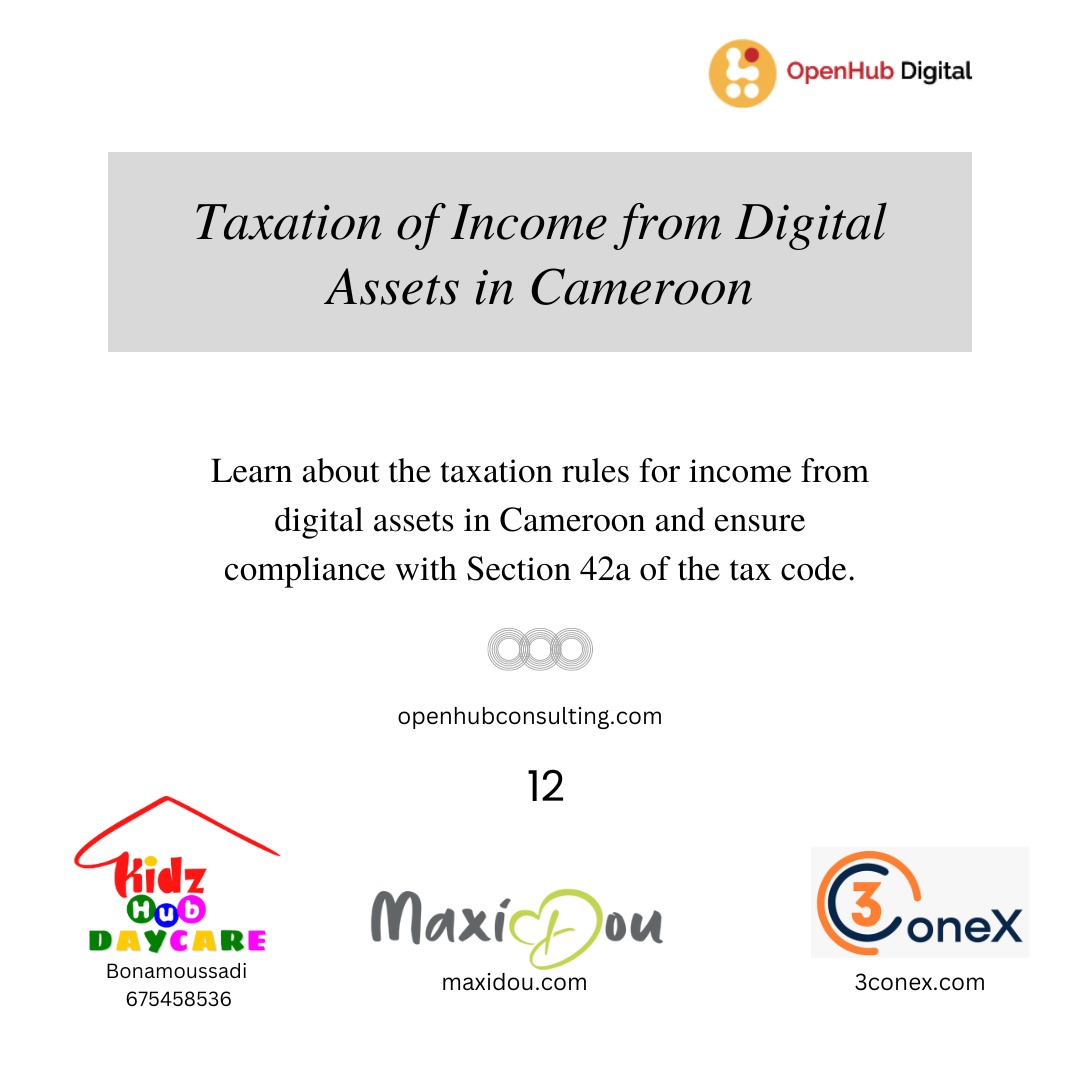In our previous post, we discussed the taxation of profits from the transfer of stocks, bonds, and other capital shares. Today, we explore the relatively new area of digital assets and how income derived from them is taxed according to Section 42a of the Cameroonian tax code.
What Are Digital Assets?
Digital assets include cryptocurrencies, tokens, and other digital forms of value representation. These assets are increasingly used for investment, transactions, and various financial activities.
Taxation of Digital Assets
Section 42a indicates that income from digital assets is subject to taxation, with methods specified by the Minister in charge of Finance. This includes:
If this article helped you, you can support our work at OpenHub.
Support OpenHub Digital- Cryptocurrencies: Income from trading or investing in cryptocurrencies.
- Digital Tokens: Gains from digital tokens used in blockchain or other digital platforms.
Example of Taxable Digital Asset Income
If you buy cryptocurrency worth CFAF 1,000,000 and later sell it for CFAF 1,500,000, the profit of CFAF 500,000 is taxable. Specific guidelines on how to report and pay taxes on this income will be issued by the Ministry of Finance.
Compliance Requirements
- Track Your Gains: Keep accurate records of purchases, sales, and profits from digital assets.
- Report Income: Follow the Ministry of Finance guidelines to report digital asset income.
- Pay Applicable Taxes: Ensure timely payment of taxes on gains from digital assets to avoid penalties.
Example Calculation
Suppose you invest in digital tokens and earn CFAF 300,000 from selling them. This profit should be reported according to the specific taxation guidelines provided by the Ministry of Finance.
Importance of Compliance
As digital assets become more prevalent, understanding and complying with tax regulations ensures legal and financial security. This is crucial for anyone involved in digital asset transactions in Cameroon.
Key Points to Remember
- Digital assets are taxable under Cameroonian law.
- Follow specific guidelines issued by the Ministry of Finance for reporting and paying taxes.
- Keep detailed records of all transactions involving digital assets.
Disclaimer
This content is for informational purposes only and should not be taken as tax advice. For personalized assistance, consult a tax professional.
Next Steps
In our next post, we will discuss the exemptions from personal income tax, including specific interest and capital gains, as per Section 43. Stay informed to make the most of these exemptions.
For comprehensive business and tax services, contact OpenHub Consulting. We specialize in company registration, tax declarations, sales and marketing, bookkeeping, and accounting for small businesses in Cameroon.
Have questions? Leave a comment or revisit our previous post here.
Previous Post: Understanding Taxable Profits from the Transfer of Stocks, Bonds, and Other Capital Shares in Cameroon
Next Post: Exemptions from Personal Income Tax in Cameroon
From Insight to Implementation
Going through the administrative and legal landscape in Cameroon requires more than just information—it requires a grounded local partner. At OpenHub Consulting, we specialize in helping the diaspora and international investors turn their business visions into compliant, operational realities.
If you are ready to move forward, our team is prepared to manage your registration and compliance from start to finish.
Start Your Company Incorporation →Discover more from OpenHub Digital
Subscribe to get the latest posts sent to your email.

